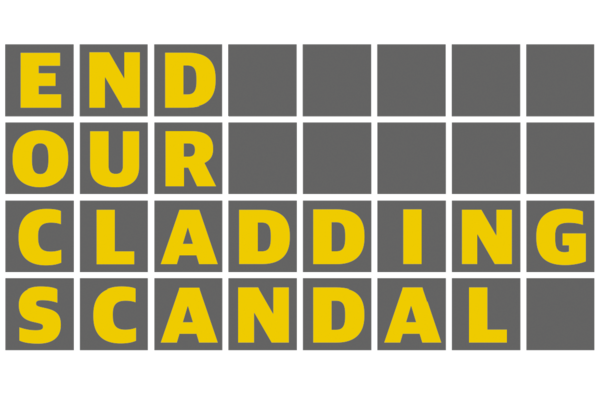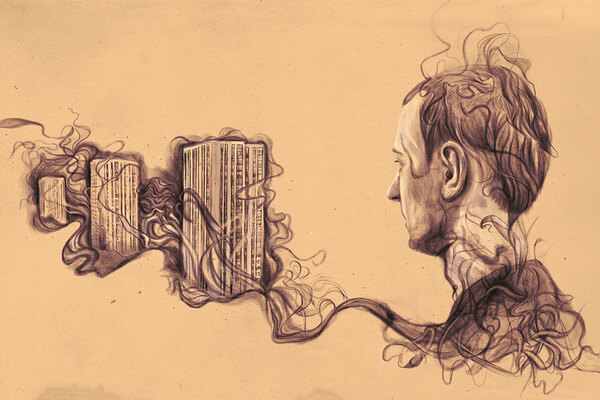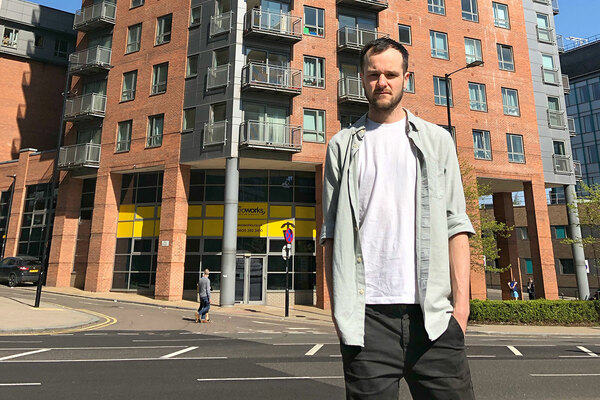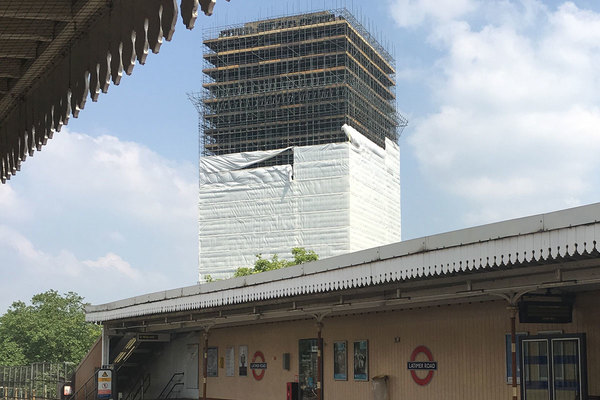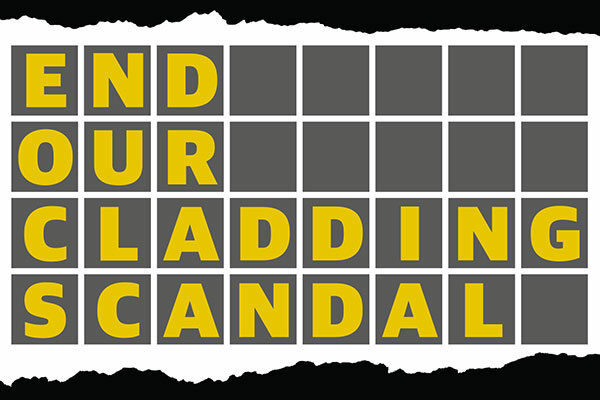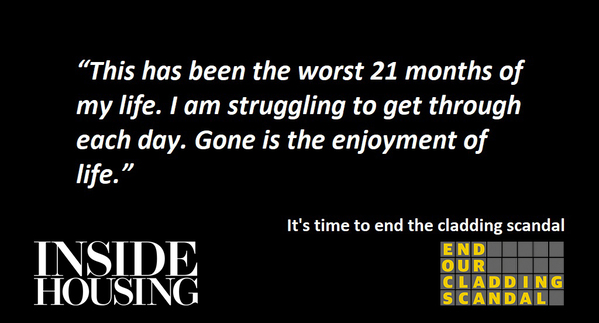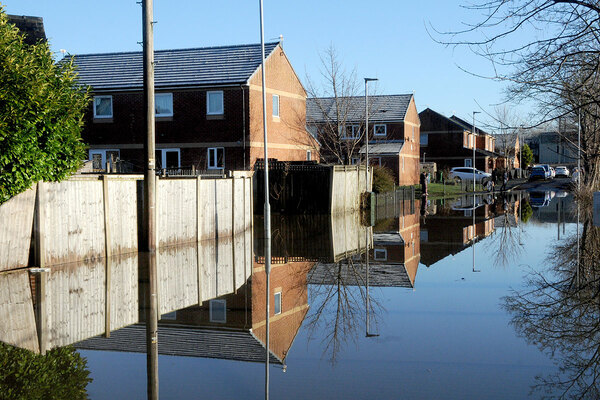Cladding crisis having ‘huge effect’ on mental health of residents, survey reveals
Almost two-thirds of leaseholders in private blocks covered with Grenfell-style cladding say the ongoing crisis is having a “huge effect” on their mental health, in a survey by the UK Cladding Action Group for Inside Housing.
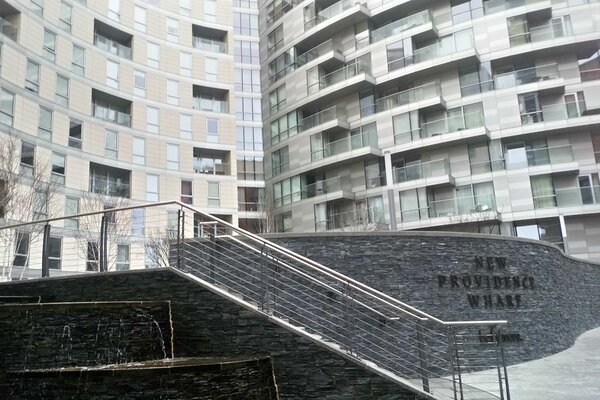
As our new campaign End Our Cladding Scandal launches this week, the survey lays bare the extent of the mental health impact the ongoing financial pressure and safety fears are having on thousands nationwide.
Based on responses from 196 affected leaseholders, it revealed that 69.5% feel anxious or worried on a daily basis and 25.5% have received medical attention due to the mental trauma, with 15.3% now on medication. A worrying 8.7% report suicidal feelings as a direct result of the crisis.
Across England, there are 176 blocks known to have Grenfell-style cladding, but with many freeholders refusing to pay, leaseholders are being sent five-figure bills for the work.
The campaign calls on the government to create a fund to pay for the work and to ensure it is completed within two years.
It has been developed alongside affected residents from London and Manchester and has the support of the National Housing Federation, Chartered Institute of Housing, Grenfell United and a number of local authorities in affected areas.
Responding, communities secretary James Brokenshire said he "fully recognises the anguish" faced by residents and said the government is "considering at pace additional interventions".
One leaseholder said: “This has been the worst 21 months of my life. I am struggling to get through each day.”
Commenting, one anonymous resident said: “[This] has been the worst 21 months of my life. I am struggling to get through each day. Gone is the enjoyment of life.”
Another added: “I genuinely believe nothing will be done until we have a second tragedy in a private block - hopefully that won’t be my block when I’m in it but who knows - it is a constant fear.
“I feel constantly stressed, anxious, depressed, lost, abandoned and devastated
by something that cannot be my responsibility.”
William Martin, a member of the UKCAG and a resident of the Metis building in Sheffield, said: “These figures reveal nothing short of a mental health crisis among residents of these buildings.
“The threat of financial ruin combined with the safety fears that come from sleeping each night in a building which is known to be unsafe is ruining lives. It is beyond time for the government to step in and act.”
Related Files
Despite repeated government pledges that leaseholders will not have to pay for the work, 86.2% of respondents said service charges had gone up to fund interim measures. A quarter estimated more than £200,000 had been spent.
The survey showed 38.3% were using alcohol as a coping mechanism, 25% said they were putting plans to start a family on hold and 10.7% have had to take loans from friends or family to cover the ongoing costs.
The government has attempted to pressure building owners or developers to cover the cost of the works, but with no legal mechanism to force them to do so this approach has faltered.
Enforcement powers for local authorities have also proved ineffective as they contain no mechanism to prevent the cost being passed to the residents, with one building owner describing them as "hollow threat".
Martin Hilditch, editor of Inside Housing, said: “Residents simply should not be made to pay for an institutional failure of building safety.
“Despite some progress, removing this cladding has been far too slow and thousands of residents are suffering as a result. The time has come for the government to act.”
James Brokenshire, communities secretary, said: "I fully recognise the anguish faced by those who continue to live in buildings with ACM cladding and ensuring their safety is of the utmost priority to me. Interim measures are in place to keep residents safe in all ACM-clad buildings, but ultimately, this cladding must be replaced.
“It is completely unacceptable that not all private building owners and developers are acting swiftly enough to ensure the long-term safety of their residents. Due to the lack of progress, the Government is looking at a range of new additional measures to get building owners to do the right thing and get on with it.
“I am considering at pace additional interventions to see that progress can be made more swiftly so that residents can feel safe in their homes.”
End Our Cladding Scandal: the mental health crisis in numbers
64.8% of residents say their mental health has been "hugely affected" by the ongoing crisis in their blocks
77.8% have experienced anxiety as a direct result of the crisis, while 23% have experienced depression and 65.8% have had difficulty sleeping
8.7% have experienced suicidal thoughts as a direct result of the cladding issues
66.3% have been told by surveyors that they cannot sell the properties
28.1% have been diagnosed with a health issue by a medical professional
86.2% have seen service charges go up, with 25% saying more than £200,000 has been spent on their blocks
25% feel they cannot start a family as a result of the issues
Source: UKCAG survey of 196 affected leaseholders and tenants in private blocks affected by cladding issues
- Martin Hilditch, editor, Inside Housing
- Manchester Cladiators
- UK Cladding Action Group
- Natasha Elcock, chair, Grenfell United
- Sadiq Khan, mayor of London
- Kate Henderson, chief executive, National Housing Federation
- Terrie Alafat, chief executive, Chartered Institute of Housing
- Andy Burnham, Mayor of Greater Manchester
- Lord Gary Porter, chair of the Local Government Association
- Polly Neate, chief executive, Shelter
- Jane Duncan, chair of the expert advisory group on fire safety, RIBA
- Andy Dark, assistant general secretary of the Fire Brigades Union
- Christina McAnea, assistant general secretary, UNISON
- Sir Peter Bottomley, Conservative MP and chair of the All-Party Parliamentary Group on Leasehold and Commonhold Reform
- Jim Fitzpatrick, Labour MP, and member of All-Party Parliamentary Group on Leasehold and Commonhold Reform
- Mark Amesbury, shadow employment minister and Labour MP for Weaver Vale
- Emma Dent Coad, former Labour MP for North Kensington
- Lucy Powell, Labour MP for Manchester Central
- Rushanara Ali, Labour MP for Bethnal Green and Bow
- George Howarth, Labour MP for Knowsley
- Graham Stringer, Labour MP for Blackley and Broughton
- Rob Ellis, presenter, Capital FM
- John Biggs, mayor of Tower Hamlets
- Paul Dennett, mayor of Salford
- Suzanne Richards, councillor and executive member for housing and regeneration on behalf of all Manchester's Labour Councillors
- Sir Richard Leese, Labour councillor and leader Manchester City Council
- John Leech, Manchester Liberal Democrat leader on behalf of all Manchester’s Liberal Democrat councillors
- Darren Rodwell, executive member for housing at London Councils and leader of Barking and Dagenham Council
- George Clarke, TV Architect
- David Walker, bishop of Manchester
- Graham Tomlin, bishop of Kensington
- John Roberts, founder of AO.com
- Josh Beaumont, professional rugby player, Sale Sharks and resident of affected building
- Bill Beaumont, former England rugby captain
- Jeremy Dyson, co-founder of the League of Gentlemen
- Andy Moss, actor who has appeared on Channel 4’s Hollyoaks and resident
- Ross Mullan, actor who has appeared in Game of Thrones
- Get Cape Wear Cape Fly, musician
- Nour-eddine Aboudihaj, spokesperson for Justice4Grenfell
- Mike Leonard, chief executive, Building Alliance
- Kate Kendrick, founder, National Leasehold Campaign
- Martin Boyd, chair, Leasehold Knowledge Partnership
- Paula Higgins, chief executive, HomeOwners Alliance
- Mark Henderson, chief executive, Home Group
- Ben Clay, founding member of the Tenants Union
- Hilda Palmer, acting chair of the Hazards Campaign
- Susan Bright, professor of law, University of Oxford
- Gill Kernick, consultant and former Grenfell Resident
- Phil Murphy, fire safety expert and tower block resident
This list will be updated. Please email peter.apps@insidehousing.co.uk if you want to support the campaign
End Our Cladding Scandal: campaign aims
- Government provides a fund to cover the cost of cladding removal and remedial works on private blocks
- A firm timescale is set out of no more than two years for the work to be carried out
- Residents are reimbursed for the interim fire safety costs incurred, and funding is to be provided for necessary internal fire safety measures identified by a competent fire risk assessor
Use our graphics to show your support for End Our Cladding Scandal
Click the links below to download images to use on social media (like the one above) to promote End Our Cladding Scandal
End our Cladding Campaign logo for Twitter
Note: If your browser does not allow you to download the image, simply right click on the graphic and click ‘save image as’ instead.
